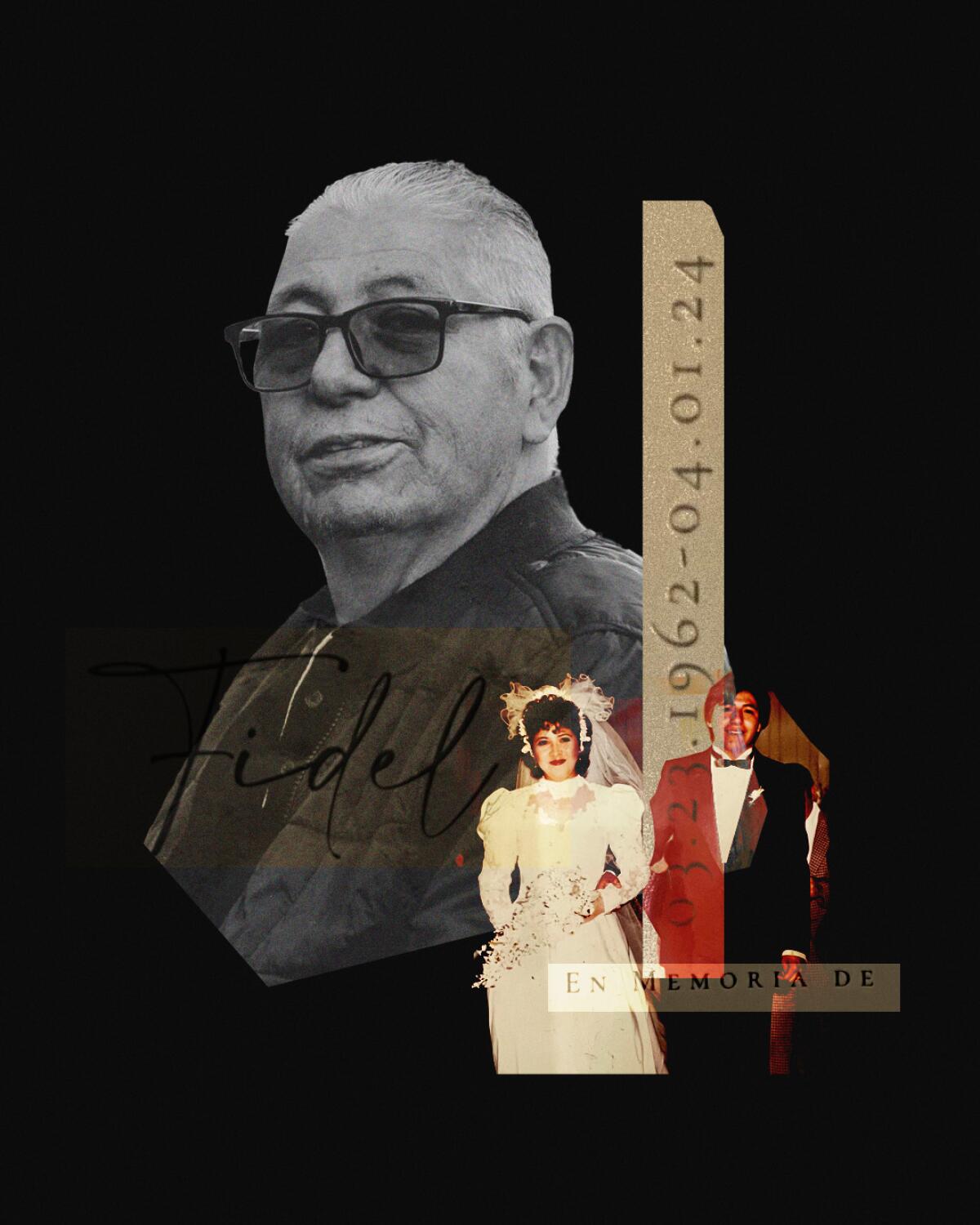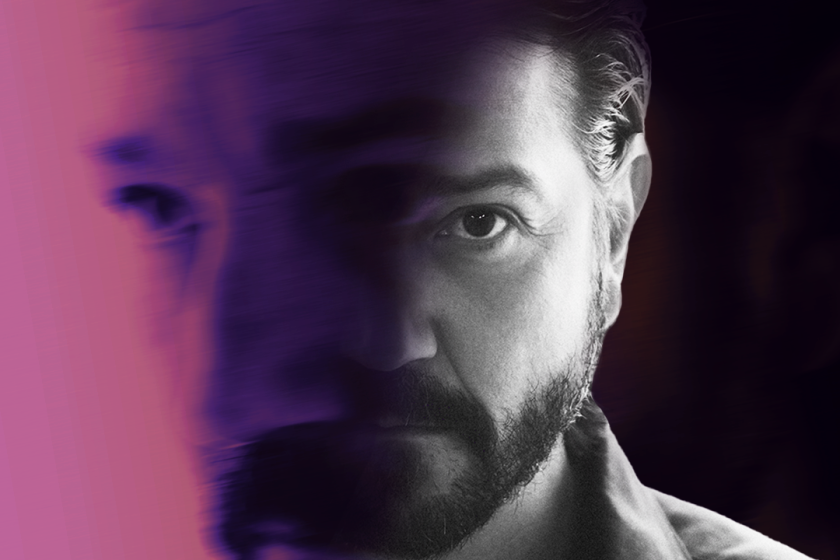Latinx Files: A eulogy for my father

- Share via
Somewhere between the Texas speed trap towns of George West and Three Rivers, my dad uttered a phrase that nearly made me swerve his car off the road.
“Estoy muy orgulloso de ti, mijo.”
It was late November 2023 and we were heading northbound on U.S. 281, one of two main arteries that connect the Rio Grande Valley to the rest of the state, on our way to Arlington to watch the Dallas Cowboys take on the Seattle Seahawks. We were on an eight-hour road trip to make, as one friend so eloquently put it, a “pocho pilgrimage” to AT&T Stadium.
The words hit me like a ton of bricks. It’s not that he hadn’t expressed or shown the sentiment before. He had, and I could always tell how proud of me he was by the way he beamed when at his asking, I would tell him about the projects I was working on. I still remember his hearty laugh and “¡Ay, que Fidel!” when I revealed to him that one of the reasons behind the Día de Muertos digital altar was to sneak my grandfather — his father — into The Times.
This felt different, though. He had spoken like someone who knew he didn’t have much time left on this earth and wanted to make sure that nothing important was left unsaid.
I gripped the steering wheel as I processed the moment, focusing on keeping the car steady on that mesquite-lined highway. I took a beat and cleared my throat, fighting back tears as I tried to formulate a response.
“Yo sé, apá.”
It was the best I could muster.
My father was diagnosed with Stage 4 cardia gastric cancer in June 2022, and ever since I’ve tried to go back to Texas as often as possible.
The first 10 months were relatively easy. I would book a round-trip flight and meet him in Houston, where he was receiving care at MD Anderson Cancer Center. We’d stay a few days so he could see his doctors and get chemotherapy treatment, and when that was over with, we would drive the six hours to South Texas. I would then spend the next two weeks with my family before it was time to head to Houston again. Once his next round of treatment was complete, I’d return to L.A. and one of my siblings or my mother would bring him home.
You’re reading Latinx Files
Fidel Martinez delves into the latest stories that capture the multitudes within the American Latinx community.
You may occasionally receive promotional content from the Los Angeles Times.
Despite the circumstances, or perhaps because of them, I came to enjoy those moments where it was just the two of us. I’d long learned that the best way to get my dad to open up was to talk to him about sports, so we killed long hours to and from Houston talking about his biggest love: fútbol. We both bought into the conspiracy theory that then-Mexican men’s national team head coach Gerardo “Tata” Martino was going to sabotage El Tri during that year’s World Cup so that Argentina would win. Such was our pessimism that we correctly predicted that Mexico would not advance past the group stage. Once in a while, after we’d exhausted all our sports stakes, he’d share tidbits of memories from his childhood. More often than not, however, he’d ask me to turn down the stereo so he could watch sermons on YouTube for his spiritual fortification.
When the summer of 2023 rolled around, it became clear to me that he wasn’t going to beat cancer. The round-trip flights booked weeks ahead became one-way tickets purchased days before, and the scheduled doctors’ appointments turned to emergency visits to the hospital. Despite the initial effectiveness of his treatment, his cancer was aggressive and spread to more parts of his body. By fall, it dawned on me that I could likely count with my fingers the number of times I’d get to see him again. This realization only strengthened my resolve to make every moment with him count, to take every opportunity to express how much I loved him. For the first time in a decade, I spent both Thanksgiving and Christmas at home. In between those holidays, I took him on the aforementioned trip to Arlington and my brother accompanied him to Mexico City for the Liga MX final. That way, we figured, if he was truly not long for this world, he may as well go out with a bang.
The wheels started falling off quickly at the start of 2024. By late January, he had lost so much weight and become so frail that he needed a walker to move around. In mid-February, his oncologist told him that they had exhausted every possible treatment. The goal now was pain management and her recommendation was hospice care.
Two weeks ago, I got a phone call from my sister who in between sobs told me that I needed to come home as quickly as possible. I was on a plane the next day.
On April 1, Fidel Martinez Sr. died at home, surrounded by his loved ones. He was 62.
I’ve spent the last few days — months, really — thinking about how I was going to eulogize my dad in this space, and the best I could come up with was to conscientiously avoid painting him as someone who worked hard at giving his children a better life. He certainly did that, but my dad was more than just his labor.
He was also a loving husband who adored his wife of 40 years; a good father to his three children; an amazing grandfather who doted on his four grandchildren; a dutiful son who visited his mother every Sunday.
I’ll miss his quick wit and sense of humor. He was a great trash talker and surprisingly great at nicknaming inanimate objects — in one of his last visits to L.A., he christened my old pickup truck “La Piñata” because of how beat up it was. Most of all, I’ll miss just being around him, being able to call him and talk about nothing in particular.
Thankfully, in the days since losing him, I’ve been able to find comfort in knowing that we had quality time together till the very end, and that he departed knowing that his family would be OK.
Above all, I’m forever grateful I got a chance to say goodbye to him.
— Fidel Martinez
Consider subscribing to the Los Angeles Times
Your support helps us deliver the news that matters most. Become a subscriber.

Things we read this week that we think you should read.
From the L.A. Times
After releasing her debut album “att.,” the Puerto Rican rapper is making her way to Coachella this weekend. Get to know the rising musician before she hits the desert stage in this interview with De Los contributor Cat Cardenas.
Here’s what Young Miko had to say about what she hopes festival attendees get out of her upcoming set: “I want people to leave that show like, ‘Who the f— was that tattooed, anime-looking a— Latin lesbian girl? I loved her show!’ That’s the goal.”
Blogger Julie Sariñana’s 5 favorite Latino-owned businesses in L.A.
Most commonly known as SincerelyJules, blogger Julie Sariñana has made a name for herself through her style, fashion tips and nail polish brand, Color Dept. As a Mexican American raised in East L.A., her hometown will always be special to her. To experience the city through her eyes, she shared some of her favorite Latino-owned spots.
99 Cents Only was an L.A. icon. Inside the fall of the popular chain
Last week, news broke that all 371 99 Cents Only Stores would be closing abruptly. Business reporters Andrea Chang and Laurence Darmiento take a look into why the chain is shutting down.
A Salvadoran cookbook from a major publisher is finally here. Why did it take so long?
After years of trying, chef Karla Tatiana Vasquez’s Salvadoran cookbook is finally coming out. Called “The SalviSoul Cookbook,” it features recipes that have been passed down through her family. Vasquez always turned to food as something that grounded her and helped her feel comfortable in her identity. But finding a willing publisher for this idea wasn’t easy — she was constantly told there was no market for this kind of book.
Elsewhere
The Great Escape: Magic Landing came and went like a desert mirage
For Texas Highways, Robert José Andrade Franco wrote about Magic Landing, a theme park that opened in his hometown of El Paso that promised to draw massive crowds to the region. Those promises never materialized after a fatality occurred shortly after opening.
As of Jan. 1, undocumented residents of California between the ages of 26 and 49 are eligible to apply for Medi-Cal. However, as Capital and Main reports, many of these newly eligible people are hesitant to sign up due to their immigration status.
— Cerys Davies
The Latinx experience chronicled
Get the Latinx Files newsletter for stories that capture the multitudes within our communities.
You may occasionally receive promotional content from the Los Angeles Times.





